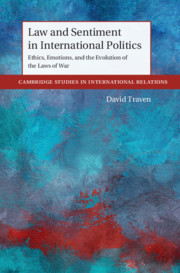Book contents
- Law and Sentiment in International Politics
- Cambridge Studies in International Relations: 155
- Law and Sentiment in International Politics
- Copyright page
- Contents
- Acknowledgments
- Epigraph
- Part I A Theory of Moral Psychology and International Norms
- Part II The Universal Grammar of the Laws of War
- 3 Taming the Sovereign
- 4 War and Peace in Islamic Law
- 5 Moral Emotions and Natural Law
- Part III Moral Sentiments and the Development of International Humanitarian Law
- References
- Index
- Cambridge Studies in International Relations (continued from page ii)
3 - Taming the Sovereign
State Formation and the Ethics of War in Ancient China
from Part II - The Universal Grammar of the Laws of War
Published online by Cambridge University Press: 11 June 2021
- Law and Sentiment in International Politics
- Cambridge Studies in International Relations: 155
- Law and Sentiment in International Politics
- Copyright page
- Contents
- Acknowledgments
- Epigraph
- Part I A Theory of Moral Psychology and International Norms
- Part II The Universal Grammar of the Laws of War
- 3 Taming the Sovereign
- 4 War and Peace in Islamic Law
- 5 Moral Emotions and Natural Law
- Part III Moral Sentiments and the Development of International Humanitarian Law
- References
- Index
- Cambridge Studies in International Relations (continued from page ii)
Summary
This chapter examines the ethics of war in Ancient China, focusing specifically on the development of Warring States political philosophy. It argues that the development of humanitarian values originated in the formation of the sovereign states system during the Warring States period. As states arose, they increasingly relied on peasant labor for agricultural resources and miltiary expeditions, which led to the development of political and moral ideas that reflected theinterests of ordinary people. Political theorists from the major intellectual schools (e.g., Confucianism, Taoism, and Mohims) developed humanitarian ideas as a way of reflecting the interests of the people. Throughout, it examines textual evidence that shows that humanitarian ideals shaped how Warring States theorists approached issues of war and peace.
- Type
- Chapter
- Information
- Law and Sentiment in International PoliticsEthics, Emotions, and the Evolution of the Laws of War, pp. 91 - 119Publisher: Cambridge University PressPrint publication year: 2021

